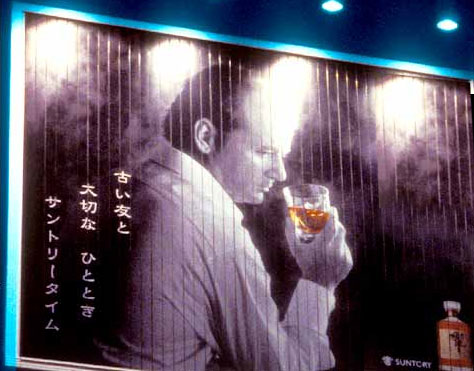
Maybe Japan is a country for old men. At least for old, American men who happen to be film actors. The most obvious example is Bill Murray finding (and whispering to Scarlett Johansson) some secret of life in Lost in Translation. But my two favorite actors, Cary Grant and Robert Mitchum also had late career successes in Tokyo. I’ve heard many bad things about Walk, Don’t Run but there are many funny moments and nothing disrupts the understanding that Grant is still infinitely charming at any age. And the Tokyo Olympic bustle behind him adds buoyancy to a part that might otherwise be mundane.
The Yakuza is the most transparently covetous of “East meets West” moments but I think Paul Schrader and Robert Towne provide a worthwhile screenplay. Mitchum is Harry Kilmer (did they give his name the r’s and the l to make its frequent pronunciation by the Japanese more humorous?), a rheumy-eyed who looks even more like a whiskey advertisement than Bill Murray.

Kilmer’s noir cowboy would be much more drab if not backgrounded by the primary color yakuza territory (rooms are painted deep blue, men have red spiders tattooed on their heads, etc.). Out of the three films mentioned, The Yakuza was shot in the middle period for Tokyo’s neon extravaganza, and I have to say I like it the most. It has variety and movement in color without the frighteningly lifelike dinosaurs.
Sure Kilmer “learns” things from his Japanese friends, but mainly confirms for himself that he is still a badass, blowing away gangsters with a shotgun (you know how casually he swings it from El Dorado, Rio Bravo, et al) while his partner Tanaka-Ken slices up enemies with a samurai sword.

The Yakuza has one perfect scene. Harry and his long-haired American apprentice recline in some kind of hip hot spring pool, distracted by scantily-clad women behind frosted glass. The architectural highlight is an aquarium full of koi fish built into a pillar just behind them. As the heroes enjoy themselves, an assassin slips underwater and swims towards them. His slither and full-back yakuza tattoo make him very koi-like. Of course, Kilmer sniffs out the ruse and stabs the man with his own knife. The resulting red-orange blood clouds a circular pool light, conjuring a murky approximation of the rising sun flag, a clunky bit of symbolism I couldn’t help loving.
The film ends with an unnecessary frenzy of sharp knives and pinky fingers in handkerchiefs but I can’t really fault it. Kilmer is honoring the yakuza, thanking them for giving him a way to feel alive again. The Yakuza and Lost in Translation come back to an essential question: which is more invigorating, killing dozens of Japanese heavies or spending a few days with Scarlett Johansson?



No comments:
Post a Comment